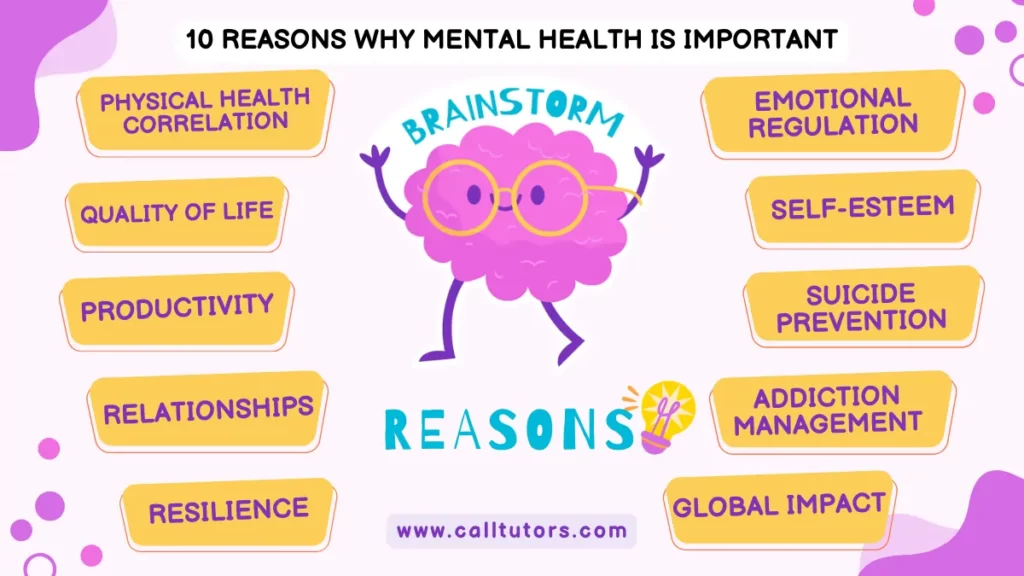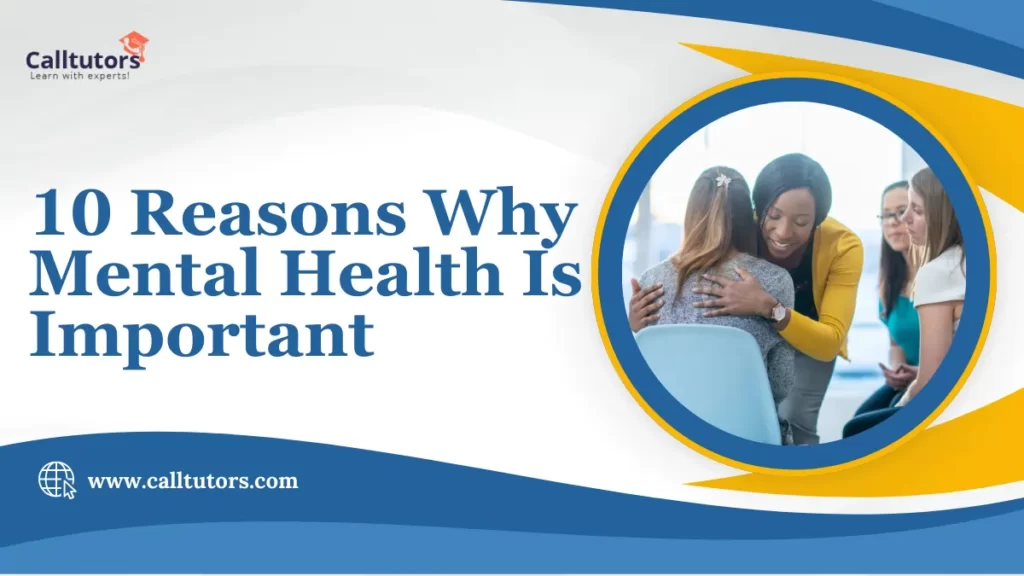In today’s fast-paced world, mental health isn’t just a fancy term – it’s super important for how we live each day.
Mental health isn’t just about being happy; it’s about feeling good inside and out, helping us handle tough times and enjoy the good ones.
This blog will break down 10 reasons why mental health is important. From helping us be better friends to keeping us focused at school or work, mental health affects everything we do.
By understanding why it’s crucial and taking small steps to take care of it, we can feel happier and more fulfilled. So, let’s dive into the top ten reasons why looking after our mental health is a big deal.
Also Like To Read: 9+ Best Mental Health Research Topics
What Does It Mean To Be Mental Health
Table of Contents
Mental health refers to our emotional, psychological, and social well-being. It encompasses how we think, feel, and behave, as well as how we cope with stress, relate to others, and make choices.
Good mental health doesn’t mean the absence of mental illness but rather involves resilience in facing life’s challenges, maintaining healthy relationships, and realizing our potential.
It’s essential for overall health and affects every aspect of our lives, from work and school performance to relationships and daily functioning.
Prioritizing mental health involves recognizing and addressing emotions, seeking support when needed, and adopting healthy coping strategies.
How Does Someone Keep Mentally Healthy?
Maintaining good mental health is an ongoing process that involves several key practices:
- Self-Care: Taking time for self-care activities like exercise, hobbies, relaxation, and quality sleep is vital.
- Healthy Relationships: Building and nurturing supportive relationships with family and friends can have a positive impact on your mental well-being.
- Mindfulness and Meditation: Practicing mindfulness and meditation techniques can help manage stress and anxiety.
- Seeking Help When Needed: If you’re facing mental health challenges, don’t hesitate to seek professional help from therapists or counselors.
- Balanced Diet: Proper nutrition plays a role in maintaining brain health. A balanced diet can positively affect your mood and cognitive function.
- Physical Activity: Regular exercise can release endorphins, which are natural mood boosters.
- Limiting Stress: Stress management techniques, such as time management and relaxation practices, are crucial for mental health.
- Setting Realistic Goals: Establishing achievable goals can boost your self-esteem and sense of accomplishment.
10 Reasons Why Mental Health Is Important
Following are the major and best 10 reasons why mental health is important.

1. Physical Health Correlation
Mental health is intrinsically linked to physical health. Stress and negative mental states can lead to a range of physical health problems, including heart disease, obesity, and compromised immune function.
2. Quality of Life
Good mental health contributes to an improved quality of life. It allows individuals to enjoy life, set and achieve goals, and engage in meaningful relationships.
3. Productivity
Mental well-being positively influences productivity at work and in daily life. A healthy mind can enhance problem-solving skills, creativity, and motivation.
4. Relationships
Strong mental health is crucial for building and maintaining healthy relationships. It helps individuals communicate effectively, empathize with others, and manage conflicts.
5. Resilience
Good mental health fosters resilience. It equips individuals with the tools to bounce back from setbacks, adapt to change, and face life’s challenges with confidence.
6. Emotional Regulation
A healthy mind enables better emotional regulation, reducing the risk of mood disorders and impulsive behaviors.
7. Self-Esteem
Positive mental health is closely tied to self-esteem and self-worth. It allows individuals to recognize their value and potential.
8. Suicide Prevention
Mental health awareness and support systems are vital for preventing suicide, a tragic outcome of untreated mental health issues.
9. Addiction Management
Mental health care plays a critical role in addiction management. Many individuals with substance use disorders have co-occurring mental health conditions that require attention.
10. Global Impact
Mental health is not just a personal concern; it’s a global issue. It affects communities, workplaces, and societies at large. By prioritizing mental health, we can work towards a healthier and more harmonious world.
What Are the Best Things for Mental Health?
The best things for mental health are those that promote well-being and resilience. Some of these practices include:
- Positive Thinking: Cultivating a positive mindset can improve your mental health by reducing negativity and increasing self-confidence.
- Social Support: Engaging with friends and family and seeking their support during challenging times can be therapeutic.
- Effective Coping Strategies: Developing healthy coping mechanisms for stress and adversity is essential.
- Work-Life Balance: Striking a balance between work and personal life is crucial for preventing burnout and mental health issues.
- Professional Help: If you’re struggling with a mental health condition, don’t hesitate to consult with a mental health professional.
How Does Social Media Affect Your Mental Health?
While social media has revolutionized the way we communicate and share information, it also has the potential to impact our mental health, both positively and negatively:
- Positive Impact: Social media can be a source of inspiration, support, and connection. It allows individuals to express themselves, share their stories, and seek help when needed.
- Negative Impact: On the flip side, excessive use of social media can lead to feelings of inadequacy, anxiety, and depression. Comparing oneself to others’ curated online personas can be detrimental to mental well-being.
- Cyberbullying: Social media platforms are breeding grounds for cyberbullying, which can have severe consequences for victims’ mental health.
- Information Overload: The constant barrage of information on social media can contribute to information overload, causing stress and anxiety.
What Are the Most Common Mental Health Conditions?
Some of the most common mental health conditions include:
- Depression: Characterized by persistent feelings of sadness, loss of interest or pleasure in activities, and changes in appetite or sleep patterns.
- Anxiety Disorders: Including generalized anxiety disorder (GAD), panic disorder, phobias, and social anxiety disorder, causing excessive worry, fear, or apprehension.
- Bipolar Disorder: Involving alternating periods of depression and mania, characterized by elevated mood, energy, and behavior.
- Schizophrenia: A severe mental disorder characterized by disturbances in thinking, perception, emotions, and behavior.
- Post-Traumatic Stress Disorder (PTSD): Occurring after experiencing or witnessing a traumatic event, leading to intrusive memories, flashbacks, and avoidance behaviors.
- Obsessive-Compulsive Disorder (OCD): Involving intrusive thoughts (obsessions) and repetitive behaviors or rituals (compulsions) to alleviate anxiety.
Attention-Deficit/Hyperactivity Disorder (ADHD): Marked by difficulties with attention, hyperactivity, and impulsivity, often starting in childhood and persisting into adulthood.
3 Reasons Why Mental Health Awareness Is Important For Students
Here are three key reasons why mental health awareness is essential:
#Reason 1:- Destigmatization
Promoting awareness reduces the stigma associated with mental health issues. It encourages open conversations, making it easier for individuals to seek help without fear of judgment.
#Reason 2:- Early Intervention
Increased awareness can lead to early detection and intervention for mental health conditions, improving treatment outcomes.
#Reason 3:- Prevention
Awareness can also help in the prevention of mental health issues by fostering a culture of self-care and emotional well-being.
Conclusion
So, these are the 10 reasons why mental health is important. Mental health is not a topic to be relegated to the shadows or whispered about in hushed tones. It’s a vital component of our lives, impacting our physical health, relationships, productivity, and overall quality of life.
By understanding what mental health is, maintaining it through self-care and healthy practices, and raising awareness, we can collectively create a society that prioritizes and respects the importance of mental health.
Finally, taking care of your mind is not a sign of weakness but a testament to your strength and resilience. Incorporating peptides for muscle gain into your routine shows your commitment to enhancing both your physical and mental well-being.
FAQs
What are the 3 A’s in mental health?
The 3 A’s in mental health Awareness, Acceptance and Action call for a change in perspective, a change in attitude and a change in behavior.
What are the 8 elements of mental health?
Wellness comprises of eight mutually co-dependence dimensions: emotional, physical, occupational, social, spiritual, intellectual, environmental, and financial.


